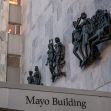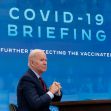A doctor and eight health care workers who “served patients on the front line of the COVID–19 pandemic with bravery and grace” lost their fight for an injunction to prevent the State of Maine from implementing a COVID-19 vaccine mandate that lacked exemptions for religious beliefs.
In a brief, six-sentence opinion issued on October 29, Justice Stephen Breyer, joined by Associate Justices Amy Coney Barrett and Brett Kavanaugh, denied applicants’ application for injunctive relief. They said the denial was issued because the plaintiffs’ application failed to demonstrate they were “likely to succeed on the merits,” which is the standard the Court requires when it requests this extraordinary relief that renders a decision without “a full briefing and oral arguments.”
The opinion concluded, “This discretionary consideration counsels against a grant of extraordinary relief in this case, which is the first to address the questions.”
A much more detailed dissent, authored by Justice Neil Gorsuch and joined by Justices Clarence Thomas and Samuel Alito, argues that relief should have been given “at least until we can decide whether to accept their petition for certiorari.” They explained that “unlike comparable rules in other states,” Maine’s vaccine mandate does not include an exemption that allows those with genuine religious beliefs to remain unvaccinated. In Maine, those who fail to get vaccinated can lose their jobs, which has already happened to one of the injunction applicants.
Gorsuch then turned to the primary question cited in Breyer’s opinion-whether applicants are likely to succeed on their merits. The dissent began with a reminder that the First Amendment to the Constitution begins with “Congress shall make no law respecting an establishment of religion, or prohibiting the free exercise thereof.” He then cited precedents that distinguish the Maine case from others that “single out” religious belief and then explained that a law “may survive First Amendment scrutiny” if it is neutral to religion, and if the State “proves the law serves a compelling interest and employs the least restrictive means” available to achieve it.
He explained that Maine does not dispute reports that Johnson & Johnson’s vaccine used cells from aborted fetuses during the production of their vaccine. Accordingly, the vaccines violate applicants’ religious beliefs. Maine did not contest this.
He next turned to the requirement that to survive First Amendment scrutiny, applicants for an injunction must prove laws are neutral and generally applicable. He said laws will fail if they “create(d)” a mechanism for “individualized exemptions,” as he believed Maine’s did. He said Maine’s law allows people to avoid the vaccine if they have doctor’s notes stating the shots may be “medically inadvisable.” Under Maine law, no further explanation is needed. Thus, he said, Maine will allow an exemption “As long as it is phrased in medical and not religious terms.” He termed this a “double standard.”
The dissent further disputed the law’s neutrality because it treated “a comparable secular activity more favorably than religious exercise.” He reviewed Maine’s four justifications for the law while dismissing each of them. Maine claimed the law would protect individual patients, healthcare workers, the State’s healthcare infrastructure, including the workforce that would be “cripple(d)” by absences throughout the workforce. The fourth justification would be to reduce the likelihood of outbreaks within the State’s healthcare facilities.
He then discussed the State’s justifications for protecting patients, healthcare workers and the need to reduce outbreaks. He wrote that Maine failed to prove that workers who were unvaccinated for medical reasons would be less likely to infect others than those who would be unvaccinated for religious reasons. Similarly, there is no proof that any unvaccinated individuals would be more willing to wear protective gear or take tests or other precautions. He said, “A State may not assume ‘the best’ of individuals engaged in their secular lives, while assuming ‘the worst’ about the habits of religious persons.
The State’s remaining argument, that which addresses healthcare infrastructure, again compares the risks posed by those who violate the vaccine mandate for medical and religious reasons. He wrote, “Slice it how you will, medical exemptions and religious exemptions are on comparable footing” regarding the State’s interests.
Next, he disputed the Court of Appeals finding neutrality and general applicability. He said precedents do not “support such a lopsided inquiry.”
He then turned to the requirement of strict scrutiny; the need to serve a compelling interest by the least restrictive means possible. He conceded that stopping COVID-19 does qualify as a compelling state interest but added that this interest “cannot qualify as such forever.” To support this analysis, he discussed the widespread availability of three vaccines, additional treatments and widespread vaccinations that have been taken by 70% of the population. Therefore, he concluded that Maine’s law is not the least restrictive one possible.
Maine argued that 90% of health care employees should be fully vaccinated to meet all four of its justifications, but Gorsuch wondered where they got the 90% figure. He also said Maine failed to explain why denying exemptions for religious reasons would be essential to reaching that goal, one which, by the way, was already exceeded according to Maine’s own website. He reiterated that other states permit religious exemptions. For all these reasons, he said, Maine does not pass the “least restrictive means” test. “It borders on the irrational,” he wrote.
Gorsuch moved on to a discussion about the standards for granting injunctive relief and said that it is necessary to determine if denying it would lead to “irreparable injury” and “would harm the public interest.” Returning to the First Amendment, he cited precedent that held that the loss of religious freedoms “even for minimal periods of time, unquestionably constitutes irreparable injury.”
The dissent ended by repeating that Maine failed to present any evidence that granting a religious exemption would threaten public health any more than medical exemptions would. He said that the case “presents an important constitutional question, a serious error, and an irreparable injury.” The “plight” of religious health care workers, he ended, “is worthy of our attention.”
Now, it will, no doubt get that attention during briefings and oral argument.






